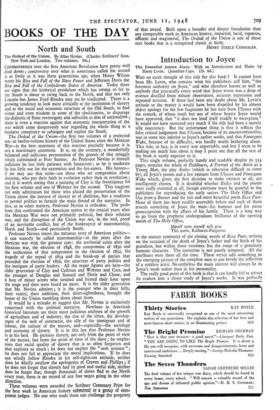BOOKS OF THE DAY
North and South
CONTROVERSIES over the first American Revolution have pretty well died down ; controversy over what is sometimes called the second is as lively as it was three generations ago, when Henry Wilson wrote his Rise and Fall of the Slave Power and Jefferson Davis the Rise and Fall of the Confederate States of America. Today there are signs that the historical pendulum which has swung so far to the South is about to swing back to the North, and that not only Lincoln but James Ford Rhodes may yet be vindicated. There is a growing tendency to look more critically at the institution of slavery and at the social and economic structure of the Old South, to find .virtue and even wisdom in some of the abolitionists, to disparage the dialectic of State sovereignty and subscribe to that of nationalism ; there is even a reaction against that economic interpretation of the war which came dangerously near regarding the whole thing as a business conspiracy to subjugate and exploit the South.
The Ordeal of the Union—the first two volumes of a projected ten- or twelve-volume history of the United States since the Mexican War—is the best statement of this reaction precisely because it is not a reactionary statement. It is, on the contrary, a wonderfully balanced and judicious presentation of the genesis of that struggle which culminated at Fort Sumter. As Professor Nevins is himself judicious he has little patience with fanaticism ; as he is moderate he has little use for the extremists and the fire-eaters. His heroes— if we may use that term—are those who set compromise above doctrine, who put their faith in evolution rather than in revolution ; and it is worth noting that a painting of Clay is the frontispiece for the first volume and one of Webster for the second. This suggests not only admiration for those who placed the preservation of the Union above the interest of slavery or of abolition, but a readiness to permit politics to furnish the main thread of the narrative. In this, as in other matters, Professor Nevins is orthodox. The prob- lems that confronted the American nation in the crucial years after the Mexican War were not primarily political, but their solution was, and the disruption of the Union was not, in the end, proof of an inevitable conflict, but of the bankruptcy of statesmanship, North and South—and particularly South.
Professor Nevins traces the tortuous story of American politics— it can scarcely be called statesmanship—in the years after the Mexican war with the greatest care: the territorial crisis after the Mexican war, the election of 1848, the compromise of 1850 and the ratification of that compromise in the election of 1852, the tragedy of the repeal of 1854 and the break-up of parties that preceded the election of r856, the structure of party politics and the intrigues of party leaders. All the major figures are here—the older generation of Clay and Calhoun and Webster and Cass, and the younger of Douglas and Seward and Davis and Chase, and a host of minor actors who strutted and fretted their hour upon the stage and then were heard no more. It is the older generation that Mr. Nevins admires ; it is the younger who in their folly, their vanity, their ambition, their short-sightedness, brought the house of the Union tumbling down about them.
It would be a mistake to suggest that Mr. Nevins is exclusively concerned with the political narrative. Nowhere in American historical literature are there more judicious analyses of the growth of agriculture and of industry, the rise of the cities, the develop- ment of the web of commerce, the role of the immigrant and of labour, the culture of the masses, and—especially—the sociology and economy of slavery. It is in this last that Professor Nevins is at his best. He pictures slavery, not only from the point of view of the master, but from the point of view of the slave ; he empha- sises that racial quality of slavery that is so often forgotten and that explains so much ; he does not neglect the " cash account "; he does not fail to appreciate the moral implications. If he does not wholly follow Rhodes in his self-righteous attitude, neither does he *holly swallow the apologetics of Craven and Phillips ; if he does not forget that slavery had its good and useful side, neither does he forget that, though thousands of slaves fled to the North every year, there is no record of any free negro going in the other direction.
These volumes were awarded the Scribner Centenary Prize for the best work in American history submitted to a group of com- petent judges. No one who reads them can challenge the propriety of that award. Built upon a broader and deeper foundation than any comparable work in American history, impartial, lucid, vigorous, affluent and magisterial, The Ordeal of the Union is one of those rare books that is a recognised classic at birth.
HENRY STEELE COMMAGER.






























 Previous page
Previous page